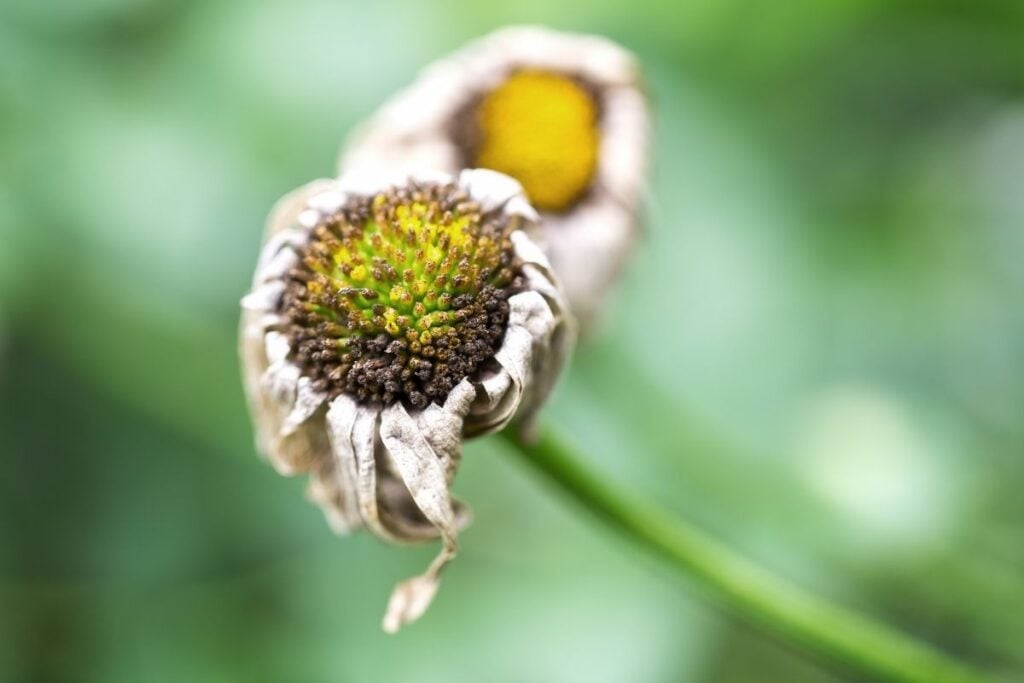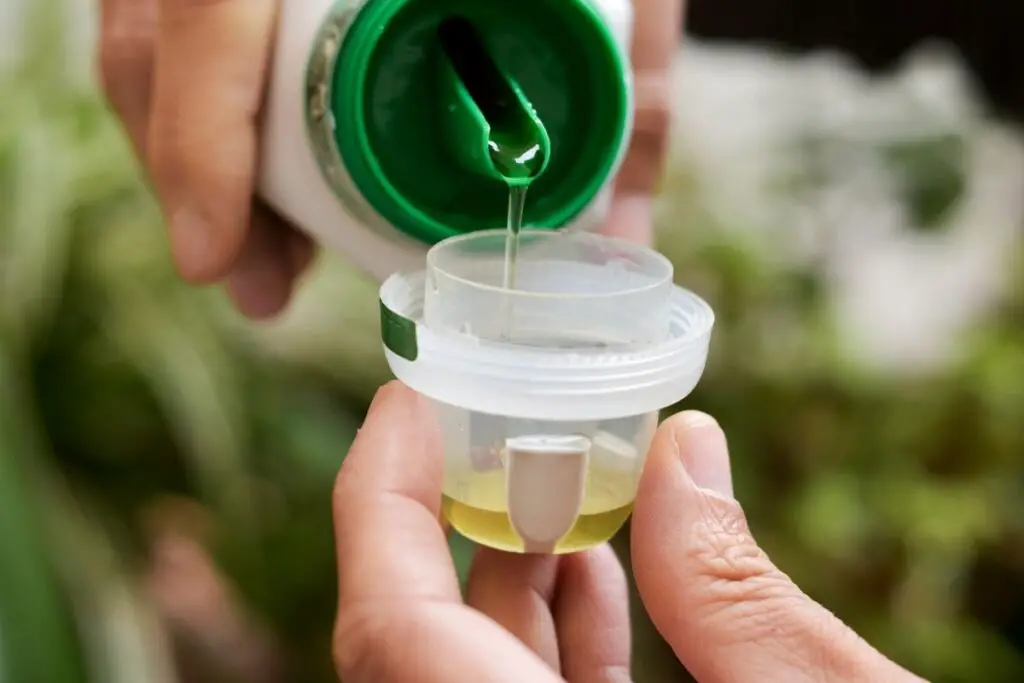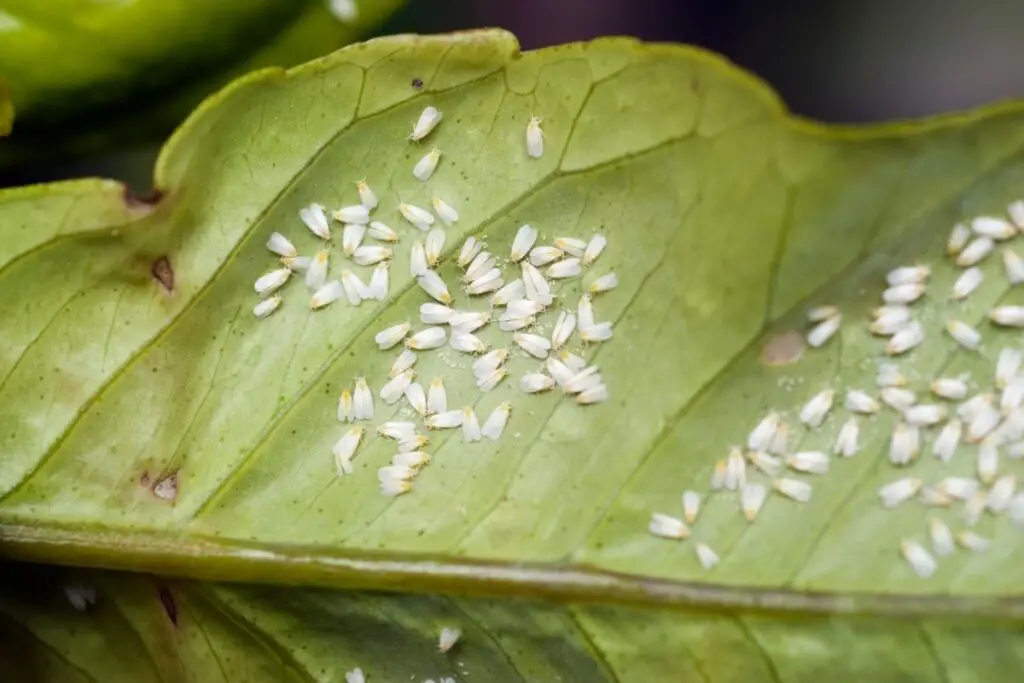Daisies are beautiful plants with stunning blooms, and they are easy to take care of. If you find your daisies not looking like their usual self you will need to check the problem it is facing, and you will have to take some basic maintenance steps which will improve the health of your Daisy plant.
If you find that the flowers and leaves of your daisies are wilting and losing their petals and leaves, you will need to nurture them to get them back in good condition.
There can be different reasons for which your daisies are wilting. In this article, we will discuss why your daisies are wilting and how to revive them?
The primary reason for the daisies to wilt is lack of water. Other causes include lack of sunlight, overfertilization, unfavorable temperature, and pest infestation. To revive dying daisies, water them adequately, fertilize them once a month and spray some neem oil to keep pests at bay.
Let us list down the reasons due to which the daisies can wilt and discuss the solution one by one.
- Improper watering
- Inadequate sunlight
- Fertilization issues
- Low humidity
- Unfavorable temperature
- Pest infestation
Also read: Are My Daisies Dying? (7 Signs Of A Dying Daisy Plant)

Improper watering
Daisies need a lot of water to thrive because they stay under the sun all day long. If you are not watering your daisies regularly, they might show signs of wilting. But if your daisies are sitting on the water for a long time, that two can be harmful to them.
Both underwatering and overwatering can be the problem due to which the daisies are wilting.
Underwatering
Daisies are sturdy outdoor plants, and therefore, they lose a lot of moisture throughout the day. This is the reason they need a consistent supply of water to remain healthy. If you do not water them for a long time due to some reason, they will start wilting and curling.
Underwatering can leave them malnourished, and the plant cannot carry out its normal functions and the synthesis of its food. They lose the normal turgidity of their cells which makes them look wilted.
Overwatering
The new gardeners tend to overwater their plants, thinking that they will grow fast if they are fed a lot of water and end up overwatering their plants.
This problem can be more severe than underwatering because it can directly harm the roots and cause root rot. Due to overwatering, the roots cannot absorb the nutrients from the soil as they stay underwater for too long.
It leaves the plant undernourished, and ultimately, the flowers and leaves of the plant start wilting. The roots are not able to breathe due to this condition, and they begin to rot. Let us understand how to revive them.
Solution
- Maintain a watering schedule for your plant atleast once a week while the other conditions are favorable.
- Before you water your plant, inspect the soil by inserting your finger into the soil at least two inches deep and see if the soil beneath is damp or dry.
- If the soil seems very dry and flaky after you checked it, then it is time to water your plant.
- But if the soil seems to be damp, you will need to wait for a few more days before watering it.
- Do not pour too much water while watering your plant.
- Make sure that the composition of the soil is draining enough and the excess water seeps through.
- To water your daisies slowly and steadily, you can use the drip irrigation method.
Also read: How Much Water Do Daisies Need? (Daisy Water Requirements)
Looking for gardening supplies? We have tested 100's of products before recommending them to you guys. Check out our best pick below:
| Image | Gardening Supplies | Best Price? |
|---|---|---|
 Top
Top Top
Top | Raised Garden Bed Kit | Check On Amazon |
 | XLUX Soil Moisture Meter, Plant Water Monitor, Soil Hygrometer Sensor for Gardening, Farming, Indoor and Outdoor Plants, No Batteries Required | No Results |
 Top
Top Top
Top | 82 Pcs Garden Tools Set and Extra Succulent Tools Set | Check On Amazon |
 | Joeys Garden Expandable Garden Hose with 8 Function Hose Nozzle, Lightweight Anti-Kink Flexible Garden Hoses, Extra Strength Fabric with Double Latex Core, (50 FT, Black) | No Results |
 Top
Top Top
Top | Dual Chamber Compost Tumbler | Check On Amazon |
 Top
Top Top
Top | Sunnyglade Plant Stakes | Check On Amazon |
 Top
Top Top
Top | Organic Cold Pressed Neem Seed Oil | Check On Amazon |
 Top
Top Top
Top | Mighty Mint Gallon :-Insect and Pest Control Peppermint Oil | Check On Amazon |
 Top
Top Top
Top | Scotts DiseaseEx Lawn Fungicide | Check On Amazon |
 Top
Top Top
Top | Jacks Classic 20-20-20 All Purpose Fertilizer | Check On Amazon |
 Top
Top Top
Top | 30,000 Seeds Pollinator Attracting Wildflower Mixture | Check On Amazon |
 Top
Top Top
Top | Survival Vegetable Seeds Garden Kit-Over 16,000 Seeds | Check On Amazon |
Inadequate sunlight
Sunlight plays the most crucial role in the growth of daisies. It is the main reason why the blooms look stunning. If your daisies are deprived of sunlight, they will not look happy. They will instead droop and wilt due to the lack of the sun.
They need to stay under direct sunlight for a minimum of six hours a day which is ideal for them to thrive. Due to some reason, they are not receiving enough sunlight, and you will need to find out what is obstructing the sunlight.
It might be a larger plant or tree that obstructs the sunlight for your daisies, or it is being cornered in your garden where there is not enough sunlight available throughout the day.
In such conditions, the daisies will not grow normally, and they might show stunted growth with the rating of leaves and flowers.
Having said that, if the temperatures are too hot during the summers and the afternoons are scorching, your plant might suffer sunburn and wilt. Below are the solutions to revive your plant.
Solution
- Plant your daisies in such a spot in your garden where the sunlight reaches in abundance.
- Make sure that it is not being guarded by another plant or tree and receives enough sunlight.
- It would help if you planted your daisies in a spot where it receives sunlight for at least six hours in a day.
- To avoid sunburn on a scorching hot summer afternoon, you can provide your daisies with a temporary shade.
Also read: How Much Light Do Daisies Need? (Daisy Light Requirements)
Fertilization issues

Since daisies are outdoor plants and draw their nutrition directly from the garden soil, they don’t need much fertilizer.
But if they have used up all the soil nutrients from the area where they’re planted, they can wilt, and they will need some support.
If the daisies have used up all the nutrients from the soil, they can start waiting due to a lack of fertilizer.
In this case, you will need to treat them with all-purpose liquid fertilizer. You will also need to read the indications on the bottle of the fertilizer before you apply it.
You can use liquid fertilizer once or twice a month, but you need to be careful not to overdo it if you are using granular fertilizer.
Too much fertilizer can cause buildup in the soil, which will harm the roots and can cause root burn. It can ultimately lead to wilting. Below are the solutions to revive your plant.
Solution
- If required, use all-purpose liquid fertilizer for your daisies once or twice a month.
- You can also use granular fertilizer. It is not diluted, and it releases the nutrients slowly in the soil over a more extended period. So, apply it every six months.
- Don’t overdo the fertilization to grow your plants rapidly. Read the labels on the fertilizer bottle and use them in moderation.
- Ensure that the fertilizers are not causing a buildup in the soil, and keep checking the soil.
Also, read: Do Daisies Need Fertilizer?
Low humidity
During winters, the humidity of the atmosphere is very low. The ideal humidity for the daisies to thrive is 60 to 65%. When the humidity levels fall, the daisies might suffer from wilting and drooping.
However, during winters, the humidity levels fall drastically, creating difficulty for your daisies. Due to very low humidity and dry conditions, the daisies can wilt.
Let us find out the solutions to revive your plant.
Solution
- In low humidity conditions, you can mist your daisies with distilled water. It can comfort them in dry conditions.
- Planting small shrubs and plants around the daisies can help to maintain the humidity levels in your garden.
- You can also use water vessels and surround your daisies with them so that due to the evaporation of water, the humidity levels will be compensated.
Unfavorable temperature
The ideal temperature for daisies is 70-75°F. The daisies can survive temperatures as low as 40°F because they are tough and resilient.
Scorching conditions can prove to be harmful to your daisies. They might start to wilt under the scorching sun on the hot summer afternoon.
Due to extreme heat, the flowers and leaves can lose all their moisture, and it can become difficult for them to stay in place. Due to weakness and lack of water, they can wilt. Below are the solutions to revive your plant.
Solution
- If the temperature is too hot, you can offer your daisies with all temporary should to protect them from sunburn.
- You can also do misting with distilled water to cool them down.
- The drip irrigation method can also help in hot weather conditions as it will supply them with moisture continuously.
Also read: Do Daisies Grow In Winter? (+Daisy Winter Care)
Pest infestation

Pests like Millie bugs, whiteflies, spider mites, etc., can attack daisies in unfavorable conditions.
You usually will not find daisies being attacked by pests, but if the conditions are too humid and moist or your Daisy is already suffering from root rot, it can be easily attacked by the pests.
Pests feed on the nutrients of the plants, and they can suck away all the plant’s energy, and the plant will start wilting and look dull.
Initially, it is challenging to Understand because the pest infestation is deceptive in the initial stages.
Once you identify that the daisies are infested by the pests, you will be able to observe the signs like wilting and drooping and discoloration of leaves.
Pest infestation is a severe issue for your plant, and it can lead to its death if not identified early.
So, if you notice that the leaves and flowers of your plant have started wilting, check if there is any pest infestation. Below are the solutions to revive your plant.
Solution
- Mist your daisies with neem oil solution. It is effective, and it will wash away all the bugs.
- Disinfect the area around your Daisy plant after you have washed away the pests.
- You can also use organic pesticides to treat the pests as it is safe for your plants.
- While using chemicals pesticides, be careful and read the instructions before you use them.
Final words
- Water your plants adequately by following a watering schedule but don’t overwater them and always check the soil before watering.
- Make sure that your plant he’s getting enough sunlight. Choose a spot in your garden where the sunlight is in abundance and plant your daisies over there.
- Supply your daisies with an adequate amount of fertilizer, and don’t over-fertilize your plant.
- If your plants are wilting check if it is infested by pests and treat them urgently to revive your plant.
Ref: Wikipedia, Britannica, University Of Florida, Ucanr.edu
